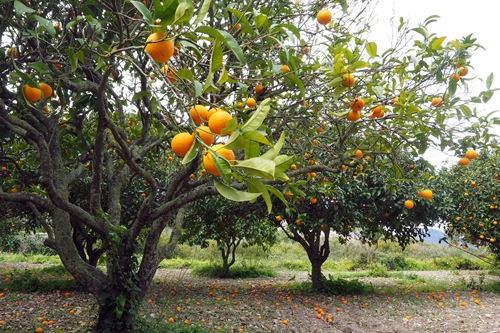11 February 2016. Plant scientists at University of California in Riverside plan to use genome editing to develop varieties of citrus fruit resistant to a bacterial disease devastating crops in the U.S. and other parts of the world. The five-year research project led by UC-Riverside plant pathologist Wenbo Ma is funded by a $4 million grant from U.S. Department of Agriculture.
Ma and colleagues are investigating molecular underpinnings of huanglongbing, more popularly known as citrus greening, a bacterial-transmitted disease that according to USDA, destroyed more than three-quarters of citrus crops in Florida. Citrus greening already devastated citrus crops in Asia and South America, and also appeared in citrus-producing states of Texas and California. No cures nor resistant varieties for citrus greening are yet available.
The Riverside team is focusing on a property of citrus greening bacteria found in the U.S., Candidatus Liberibacter asiaticus, to manipulate immunity defenses of the citrus plant hosts. These bacteria are able to secrete proteins known as effectors into a citrus plant’s circulatory system, making it more susceptible to the infection.
The researchers aim to find out much more about these effector proteins, with genome sequencing and bioinformatics, particularly if the proteins differ between among the outbreaks in the three citrus-producing states. From this analysis, the team plans to identify a core set of effectors common to all three outbreaks to serve as a target for screening against libraries of engineered antibodies. Those antibodies that bind easily to effectors can help detect the disease in plants before symptoms develop.
Ma and colleagues plan as well to apply what they learn about effectors to modify the citrus genome for building resistance to these proteins. The researchers are expected to apply the genome editing technique known as Crispr, short for clustered, regularly interspaced short palindromic repeats. Crispr is a technology based on bacterial defense mechanisms that uses RNA to identify and monitor precise locations in DNA. The actual editing of genomes with CRISPR employs an enzyme known as Crispr-associated protein 9 or Cas9. RNA molecules guide Cas9 proteins to specific genes needing edits, in this case genes considered susceptible to effector proteins.
The researchers plan to edit citrus genomes with Crispr/Cas9 to produce varieties resistant to citrus greening effectors. The team points out that these genome-edited varieties will not import genes from other plant species, thus are not considered genetically modified. However, the project includes tests of consumer sentiment toward genome-edited crops, as well as outreach and education programs with growers and other key publics.
The UC-Riverside project is one of seven studies of citrus greening announced on 1 February by USDA, totaling $20.1 million. The funding comes from USDA’s Specialty Crop Research Initiative – Citrus Disease Research and Extension Program administered by National Institute of Food and Agriculture.
Read more:
- GMO Database Begun for European Regulators
- Crop Disease Images Collected, Available Via Smartphones
- Crop Biotech Acquires Genomic Engineering Technology
- Gene Editing Modifies Tree Genomes to Reduce Lignin
- Patent Awarded for Plant Gene Sequence Engineering
* * *


 RSS - Posts
RSS - Posts
[…] Gene Editing Enlisted to Fight Citrus Greening […]
[…] Gene Editing Enlisted to Fight Citrus Greening […]